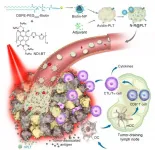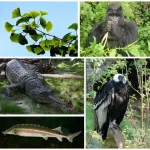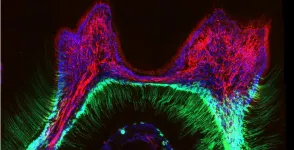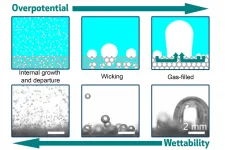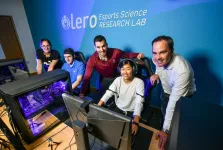World-first discovery paves way to new cancer treatment
Australian researchers have discovered a new way to target an aggressive childhood cancer, neuroblastoma, one of the most common and dangerous cancers in young children
2021-03-26
(Press-News.org) Australian researchers have discovered a new way to target an aggressive childhood cancer, neuroblastoma, one of the most common and dangerous cancers in young children.
The discovery may also have important implications for some other aggressive cancers in children, including certain brain tumours, as well as some adult cancers, including ovarian and prostate cancer.
The new research, led by scientists at Children's Cancer Institute and published in Nature Communications, has discovered that a cellular protein called ALYREF plays a crucial role in accelerating the effects of the cancer driver gene, MYCN, in neuroblastoma.
Scientists have known for some time that the one third of children with neuroblastoma who have very high levels of MYCN in their cancer cells have a much poorer prognosis. However, MYCN has proven to be an unreachable target for drug design. Instead, scientists have turned their attention to finding other molecules that work in close partnership with MYCN.
In the new research, Children's Cancer Institute scientists have shown that MYCN depends on ALYREF to drive the growth of neuroblastoma cells. According to Dr Zsuzsi Nagy and lead researchers Professor Glenn Marshall AM and Dr Belamy Cheung, this is a world-first discovery.
"We have been able to show for the first time that ALYREF binds to and actually controls MYCN function in neuroblastoma cells," explains Professor Marshall. "This means we now have a new molecule that we can target... a new way to get at MYCN and stop it from driving aggressive cancer growth."
Working with neuroblastoma cells, Professor Marshall and his team found that ALYREF bound to MYCN directly to switch on another protein, USP3, which prevents MYCN being degraded. This maintains the extremely high levels of MYCN needed to drive the cancer, and so acts as an accelerant. These findings strongly suggest that ALYREF inhibition could interrupt this cycle and prove to be a very valuable new therapeutic strategy for high-risk neuroblastoma.
The next step will be to develop a potent and specific ALYREF inhibitor - a drug capable of inhibiting the actions of this molecule ? and to test this in laboratory models
"This research provides new knowledge as a basis for drug discovery," said Dr Cheung. "Once we find a suitable drug candidate, we can take this to clinical trial in children with high levels of MYCN and ALYREF in their tumours."
Excitingly, targeting ALYREF may also prove to be a useful therapeutic strategy for other types of cancer which, like high-risk neuroblastoma, are known to be MYCN-driven. These include blood cancers, medulloblastoma, glioblastoma, retinoblastoma, ovarian cancer, Wilms' tumour, and neuroendocrine prostate cancer. Further research will be needed to explore this potential.
INFORMATION:
This work was supported by Program Grants (Prof Glenn Marshall) from the National Health and Medical Research Council (NHMRC) Australia (APP1016699), Cancer Institute NSW (10/TPG/1-13), Cancer Council NSW (PG-11-06). This work was also supported by NHMRC Project grant APP1125171 and Neuroblastoma Australia (Prof Glenn Marshall and Dr Belamy Cheung). Funding from the Victorian Government Operational Infrastructure Support Scheme to St Vincent's Institute is acknowledged. The authors acknowledge the Steven Walter Children's Cancer Foundation for their continuous support. The authors also acknowledge the support from the University of New South Wales Centre for Childhood Cancer Research, UNSW Sydney, Sydney, NSW, Australia. Prof Michael Parker is a National Health and Medical Research Council of Australia Research Fellow."
ELSE PRESS RELEASES FROM THIS DATE:
2021-03-26
Tumor targeting and intratumoral penetration are long-standing issues for cancer therapeutics.
Researchers from the Institute of Process Engineering (IPE) of the Chinese Academy of Sciences and the University of Chinese Academy of Sciences (UCAS) have developed a new platelet-based formulation which demonstrated potent therapeutic effects against cancer in murine models.
The scientists utilized the aggregation and activation features of the platelets to address issues of tumor targeting and intratumoral penetration. Upon carrying photothermal nanoparticles and immunostimulators, this biomimetic formulation also achieves an efficient combination therapy against multiple types of cancer.
This study was published in Science Advances on March 26.
Recently, photothermal ...
2021-03-26
One million species are under threat of extinction worldwide, primarily due to adverse human impact. The loss of a species is an ethical tragedy, but additionally, it can have dramatic effects on the functioning of ecosystems on Earth. In each ecosystem, species have their roles, just like actors do in a play. These roles depend on the characteristics of the species, like their size, weight, shape, reproductive capacity, or the food resources they use. If some species are similar, they can sometimes substitute each other and keep the ecosystem going even if one of them is lost. However, the accumulated ...
2021-03-26
For people with tooth decay, drinking a cold beverage can be agony.
"It's a unique kind of pain," says David Clapham, vice president and chief scientific officer of the Howard Hughes Medical Institute (HHMI). "It's just excruciating."
Now, he and an international team of scientists have figured out how teeth sense the cold and pinpointed the molecular and cellular players involved. In both mice and humans, tooth cells called odontoblasts contain cold-sensitive proteins that detect temperature drops, the team reports March 26, 2021, in the journal Science Advances. Signals from these cells can ultimately trigger a jolt of pain to the brain.
The work offers an explanation for how one ...
2021-03-26
Because of their interactions and conflicts with the major contemporaneous civilizations of Eurasia, the Scythians enjoy a legendary status in historiography and popular culture. The Scythians had major influences on the cultures of their powerful neighbors, spreading new technologies such as saddles and other improvements for horse riding. The ancient Greek, Roman, Persian and Chinese empires all left a multitude of sources describing, from their perspectives, the customs and practices of the feared horse warriors that came from the interior lands of Eurasia.
Still, despite evidence from external sources, little is known about Scythian history. Without a written ...
2021-03-26
'A persistent and troubling rural disadvantage'
Strategies needed to support rural Americans
CHICAGO ---Heart failure deaths are persistently higher in rural areas of the United States compared with urban areas, reports a new Northwestern Medicine study. The research also showed race disparities in heart failure are prevalent in rural and urban areas with greatest increases among Black adults under 65 years old.
Heart failure deaths have been increasing nationally since 2011, but there is significant geographic variation in these patterns based on race.
"This work demonstrates a persistent and troubling rural disadvantage with significantly higher rates of death in rural areas compared with urban areas," said lead study author Dr. Sadiya ...
2021-03-26
University of Maryland School of Medicine (UMSOM) researchers have identified the most toxic proteins made by SARS-COV-2--the virus that causes COVID-19 - and then used an FDA-approved cancer drug to blunt the viral protein's detrimental effects. In their experiments in fruit flies and human cell lines, the team discovered the cell process that the virus hijacks, illuminating new potential candidate drugs that could be tested for treating severe COVID-19 disease patients. Their findings were published in two studies simultaneously on March XX in Cell & Bioscience, a Springer Nature journal.
"Our work suggests there is a way to prevent SARS-COV-2 from injuring the body's tissues and doing extensive damage," says senior author of ...
2021-03-26
Using electricity to split water into hydrogen and oxygen can be an effective way to produce clean-burning hydrogen fuel, with further benefits if that electricity is generated from renewable energy sources. But as water-splitting technologies improve, often using porous electrode materials to provide greater surface areas for electrochemical reactions, their efficiency is often limited by the formation of bubbles that can block or clog the reactive surfaces.
Now, a study at MIT has for the first time analyzed and quantified how bubbles form on these porous electrodes. The researchers have found that there are three different ways bubbles can form on and depart from the surface, and that these can be precisely controlled ...
2021-03-26
Limerick, Ireland, 26 March 2020: Researchers at Lero, the Science Foundation Ireland Research Centre for Software and University of Limerick (UL), have found video gamers can significantly improve their esport skills by training for just 10 minutes a day.
The research team at Lero's Esports Science Research Lab (ESRL) at UL also found novice gamers benefited most when they wore a custom headset delivering transcranial Direct Current Stimulation (tDCS) for 20 minutes before training sessions.
Dr Mark Campbell, director of Lero's Esports Science Research Lab (ESRL) and senior lecturer in sports psychology at UL, said their work showed that neurostimulation could accelerate motor performance improvements specifically in novice esports ...
2021-03-26
Patients with lupus are more likely to have metabolic syndrome and insulin resistance - both factors linked to heart disease - if they have lower vitamin D levels, a new study reveals.
Researchers believe that boosting vitamin D levels may improve control of these cardiovascular risk factors, as well as improving long-term outcomes for patients with systemic lupus erythematosus (SLE).
Given that photosensitivity is a key feature of SLE, the scientists say that a combination of avoiding the sun, using high-factor sunblock and living in more northerly ...
2021-03-26
What The Study Did: Insurance claims were used to assess patterns of telehealth use across surgical specialties before and during the COVID-19 pandemic.
Authors: Grace F.Chao, M.D., M.Sc., of the National Clinician Scholars Program at the University of Michigan and Veterans Affairs Ann Arbor in Michigan, is the corresponding author.
To access the embargoed study: Visit our For The Media website at this link https://media.jamanetwork.com/
(doi:10.1001/jamasurg.2021.0979)
Editor's Note: The article includes conflict of interest and funding/support disclosures. Please see the article for additional information, including other authors, author contributions ...
LAST 30 PRESS RELEASES:
[Press-News.org] World-first discovery paves way to new cancer treatment
Australian researchers have discovered a new way to target an aggressive childhood cancer, neuroblastoma, one of the most common and dangerous cancers in young children
